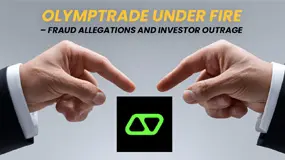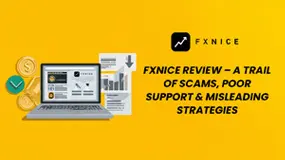简体中文
繁體中文
English
Pусский
日本語
ภาษาไทย
Tiếng Việt
Bahasa Indonesia
Español
हिन्दी
Filippiiniläinen
Français
Deutsch
Português
Türkçe
한국어
العربية
Think You’re Too Smart to Fall for an Investment Scam?!
Abstract:Investment scams are no longer the domain of obvious fraudsters and badly written emails. Today’s scams are polished, convincing, and alarmingly professional. They mimic the language and appearance of legitimate investment firms, targeting everyone from novice investors to seasoned professionals. A single mistake could wipe out years of savings. But by learning to spot the red flags early, you can protect yourself and your finances from these increasingly deceptive traps.

Investment scams are no longer the domain of obvious fraudsters and badly written emails. Todays scams are polished, convincing, and alarmingly professional. They mimic the language and appearance of legitimate investment firms, targeting everyone from novice investors to seasoned professionals.
The stakes are high. A single mistake could wipe out years of savings. But by learning to spot the red flags early, you can protect yourself and your finances from these increasingly deceptive traps.

If someone promises you sky-high returns, especially with phrases like “guaranteed profits” or “double your money in weeks”, alarm bells should be ringing. Fraudsters rely on greed and urgency, knowing that inflated returns are tempting. But in reality, no legitimate investment is risk-free, and high returns always carry proportionate risk.
What to do:
Compare the advertised returns with average market performance. Most long-term investments grow slowly and steadily. If a product promises more than 8–10% annually, or even monthly, with zero risk, its likely a scam. Always remember: if it sounds too good to be true, it probably is.

Scammers don‘t want you to think too much as they want your money quickly. That’s why they use high-pressure tactics such as “this offer expires today” or “we‘re only accepting a few more investors.” They’ll discourage you from taking time to do your research or speak with a financial adviser.
What to do:
Legitimate investments don‘t expire overnight. Take your time. Ask for all documentation, and don’t be afraid to walk away if you feel rushed or uncomfortable.

Many scams operate outside the reach of financial regulators. They may provide impressive-looking documents or websites, but no real oversight backs them. Some even pose as licensed firms, using cloned websites or fake registration numbers.
What to do:
In the UK, always check with the Financial Conduct Authority (FCA). Their online register allows you to verify whether a firm is authorised. If you‘re outside the UK, your country’s financial regulatory body (like the FSCA in South Africa or SEC in the US) will have similar tools. To do this in just a few clicks, download the free WikiFX mobile application that houses all the information you need of over 50,000 investment firms worldwide.


Fraudsters often hide behind technical jargon. Beware of those claiming they use “AI-powered algorithms,” “quantum trading models,” or “blockchain arbitrage.” They avoid explaining how the investment actually works and hope youll be too intimidated to ask.
What to do:
Ask for a clear, simple explanation. If they can't provide one or try to belittle you for asking, then thats a red flag. A legitimate adviser should help you understand how your money is being used.

Whether its a cold call, unsolicited email, or even a direct message on LinkedIn, scammers often pretend to be financial professionals with a unique opportunity “just for you.” They may use fake reviews, paid actors in testimonials, or even impersonate known figures to gain your trust.
What to do:
Be cautious with any investment pitch that comes to you unsolicited. Look up the company independently. Dont use any links they send. It is best to go directly to official websites and regulatory registers. And never be swayed by a glossy brochure or Instagram post of someone lounging on a yacht.

Disclaimer:
The views in this article only represent the author's personal views, and do not constitute investment advice on this platform. This platform does not guarantee the accuracy, completeness and timeliness of the information in the article, and will not be liable for any loss caused by the use of or reliance on the information in the article.
Read more

Olymptrade Under Fire – Fraud Allegations and Investor Outrage
The message is loud and clear for Olymptrade - Get your act RIGHT or continue to face fraud allegations and investor outrage. With investor complaints refusing to stop, Olymptrade has all but lost trust and goodwill.

Busted! 5 Brokers Blacklisted by the FCA
The FCA (Financial Conduct Authority) warns people about unauthorised brokers—operating without a proper license. If a broker is unregistered, you have no legal protection or refunds if they take your money or fail to handle it properly. FCA has recently blacklisted.5 scam brokers. Checkout the List Below.

Is the Forex Bonus a Genuine Perk or Just a Gimmick?
Have you received a forex bonus offer from a broker? Wondering whether it is a pure marketing ploy to make you a client? Your doubt makes sense! Explore this story where we have uncovered details regarding forex deposit bonus, no deposit bonus, and other types.

FXnice Review – A Trail of Scams, Poor Support & Misleading Strategies
FXnice, surprisingly, is not proving nice for forex traders all over. Traders have been requesting the company officials to allow them to withdraw their funds. However, these officials provide them a false reason, i.e., unverified accounts for withdrawal denials. Inaccurate technical tools and incompetent analysts further add to the investors' woes. Dive into this much-awaited exposure story on FXnice.
WikiFX Broker
Latest News
U.S. doubles down on Aug. 1 tariffs deadline as EU battles for a deal
Buffett and Thorp’s Secret Options Strategies
Sharing Trading Mistakes and Growth
Trading Market Profile: A Clear and Practical Guide
Eyeing Significant Returns from Forex Investments? Be Updated with These Charts
Mastering Deriv Trading: Strategies and Insights for Successful Deriv Traders
Brexit made businesses abandon the UK. Trump's hefty EU tariffs could bring them back
Can We Just Skip To Next Week
Insider report: These stocks had the biggest sales by executives in the past week
How to Use a Free Forex Trading Bot for Big Profit
Currency Calculator


